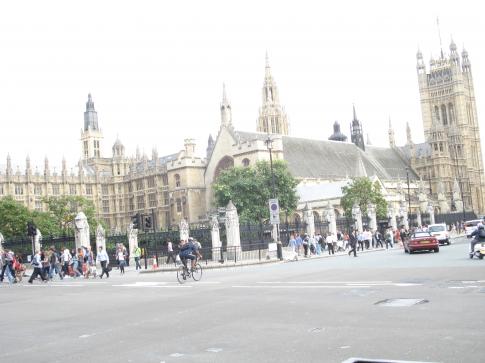* * *

Despite pushing for integration after 1945, the Euroscepticism of the UK let France shape the EU and Germany dominate it...
A British Labour MP recalls taking some trade union colleagues to Brussels to show them how the EU's core institutions work. Being British they were sceptical and suspicious, but once they got stuck into the finer points of health and safety legislation, where MEPs strive hard to protect workers, their attitudes changed to one of enthusiasm for what the 766-strong parliament might achieve for them.
Health and safety rules are rarely popular except among those whose lives they have changed. But the story could be repeated across a host of sectors and interests where British citizens benefit from what "Brussels" and "Strasbourg" do for them – from cleaner beaches and ice cream made from cream not pig fat (a famous early example) to current battles over mobile phone roaming charges and other clashes with tax-nimble global corporations that states hesitate to take on.
It does not make much difference. As with the blue and gold flag adorning regional infrastructure projects Brussels has helped to fund, the UK's public's response is rarely generous and reflects the relentless pounding the EU takes from most of the British press. When the Daily Mail enthusiastically promotes a European parliament report or decision it agrees with that does not prevent it returning to the attack on the adjoining page.
It was ever thus. Though militantly anti-EU Tory MEPs such as Dan Hannam, let alone Ukip's Nigel Farage, love to claim democratic liberty as a British invention they noisily despise Europe's earnest attempt over the 50 years since the original assembly became a "parliament" (directly elected since 1979 after UK pressure too) to acquire real powers that shape policy and call the EU bureaucracy to account as "Europe's soap box" on behalf of 375 million voters.
It has not been for want of trying. Back in 1975 when Labour's Harold Wilson staged the last EU referendum to keep his divided cabinet intact, Helmut Schmidt, then German chancellor, addressed a special Labour conference at Westminster in beautiful English and flattering terms ("There is a tide in the affairs of men," he said, quoting Shakespeare's Julius Caesar). Come and join us to build a social democracy, he asked.
Conference and party voted no. The pro-Europeans (they included Margaret Thatcher) won the referendum by 2-1 and it took Labour another decade (and a pro-EU split by the SDP faction) to reverse its hostility to the "capitalist" project under Neil Kinnock, later an EU commissioner. This time the inspiration was a mixture: fear of free-market Thatcherism at home and admiration for the vision of the French socialist president of the commission, Jacques Delors, the only Euro-pol to become a household name. Labour has remained pro-EU ever since, its gone-native MEPs often more integrationist than agnostics at home. Only the Lib Dems and Greens have been consistent Europhiles.
By the time of Labour's late 80s conversion, the Tories had swung the other way, despite Thatcher signing the highly integrationist Single European Act of 1986. It eventually cost her the premiership and has hobbled her party ever since. Appeasing Europhobia by promising to quit the conservative European People's party (EPP) faction as "too federalist" clinched the Tory leadership for David Cameron in 2005. He has tried to walk a tightrope ever since: renegotiate the UK's terms and stay in is his position, as it was Wilson's in 1975. But the Ukip albatross grows bigger by the year and may destroy his career.
Throughout the protracted UK love-hate affair with Europe, surely the legacy of a different history (Britain and Sweden are the only EU member states not occupied by foreign armies and/or domestic dictatorship in the 20th century), the parliament has usually been a sideshow, an easy target for tabloid mockery over its extravagance, the Brussels-to-Strasbourg "gravy train," the expenses and pensions, the folly of some reforms, the eccentricity of some MEPs (not least the British).
At any given time there are usually about 10 former MPs, politicians who lost their Westminster seat but love the trade and found another platform. Few have ever been major figures or become them, though ex-MEP Nick Clegg is a rare, if accidental, exception. In old age Labour's former cabinet veteran, the charismatic Barbara Castle, was once an (unelected) MEP and Strasbourg star, a pattern more common elsewhere in Europe. For Britain even appointing an EU commissioner is too often seen as somewhere to park an inconvenient Westminster colleague, not as a chance to augment British influence.
Little wonder that turnout for European parliamentary elections has remained tepid, though at 34.7% in 2009 the UK's record is slightly better than at the first direct elections (32.35%) in 1979. Elsewhere it has tailed off badly, below 50% since 1999, 43% last time. The pan-EU recession – and the embrace of austerity to address it – have only served to promote a nationalist backlash in many states, large and small. Its impact may be significant in the newly elected parliament.
That too will reflect a form of British influence that is at the heart of the paradox of Britain's relationship with Europe since the second world war. Having called for European integration in the ruins of disastrous wars, but initially stayed aloof itself, London allowed France to shape the EU institutions and Germany's economic power to dominate them.
Yet from globalised free markets and democratic accountability to the tone of judgments from European courts, British instincts have often prevailed over the bureaucrats and the autocrats. In the past decade, the British have even managed to export their own corrosive and comically short-sighted form of Euroscepticism .
What an irony if Nigel Farage MEP, a boozy metal trader from the under-regulated City of London, proved to be Britain's last, toxic contribution to the project./Guardian




 del.icio.us
del.icio.us Digg
Digg

Post your comment